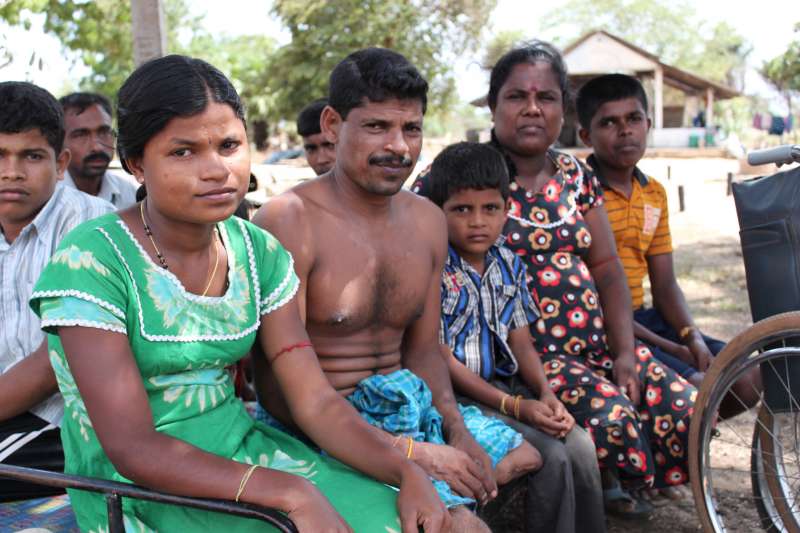Manikkarasan Nathan (second from left) and his family finally return home back after leaving Menik Farm camp.
COLOMBO, Sri Lanka, September 27 (UNHCR) – Menik Farm, once the world's largest camp for internally displaced people (IDP), closed this week, bringing Sri Lanka's population displacement crisis closer to final resolution three years after the civil war ended.
"The closure of the camp is a significant step towards ending displacement in Sri Lanka, but there are still people displaced in different situations who need to find a solution," said Michael Zwack, UNHCR's representative in Sri Lanka.
The government opened the 700-hectare Menik Farm in northern Sri Lanka's Vavuniya district as an IDP site in 2009 and, at its peak, later that year, it held 225,000 people. When it was shut down on Monday, there were just 346 people left.
But this last group of people was not allowed to return to their homes in the Kepapilavu area of north-eastern Sri Lanka's Mullaitivu district because their land is being occupied by the military. They were, instead, relocated on state-owned land and they must wait to hear if they will be able to return home or, if not, whether they will receive compensation.
While acknowledging government efforts to resolve the issue, Zwack stressed that allowing people to settle anywhere in the country, and resolving legal ownership of land, is a key part of the reconciliation process.
Although exact numbers are still unclear, military occupation of private homes and lands affects many people who have gone back to their villages in former conflict areas in the north, such as former fisherman Manikkarasan Nathan, who spent more than two years in Menik Farm.
"When we came back in early September this year, we couldn't go directly to our homes, because the military was staying on our lands," said the 40-year-old, who lost both his legs while trying to flee his home in Mullaitivu during the final battles in 2009. "They promised to leave when we returned, but it took them weeks to vacate the land." Hundreds of families are also left stranded and in transit locations because of mine clearance on and around their lands.
Menik Farm camp was designated an IDP site in May 2009 to shelter tens of thousands of people fleeing the final stages of Sri Lanka's three-decade-long conflict. UNHCR and many other organizations provided basic services such as shelter, food, water and sanitation, education and primary health care.
Rasaiah Gnanabiha, who spent almost two years from April 2009 on Menik Farm before returning to her village in the country's northern district of Kilinochchi, said she had faced many difficulties at first.
"The camp was very crowded and we didn't have proper shelter or water," she recalled. "But as time went on, as people started to leave the camp to go back to their homes and more assistance came in, the situation improved."
UNHCR has been supporting the government's resettlement programme for IDPs. The refugee agency provides returnees with a shelter cash grant and basic household items like bedsheets, jerry cans, kitchen sets and jungle clearing tools.
Nathan is finally able to start using his shelter cash grant – the military vacated his home earlier this week. He and his family spent several weeks living in a small church, worried about snakes at night and getting enough water during the day. Now he can start rebuilding his life.
By Sulakshani Perera in Colombo, Sri Lanka

